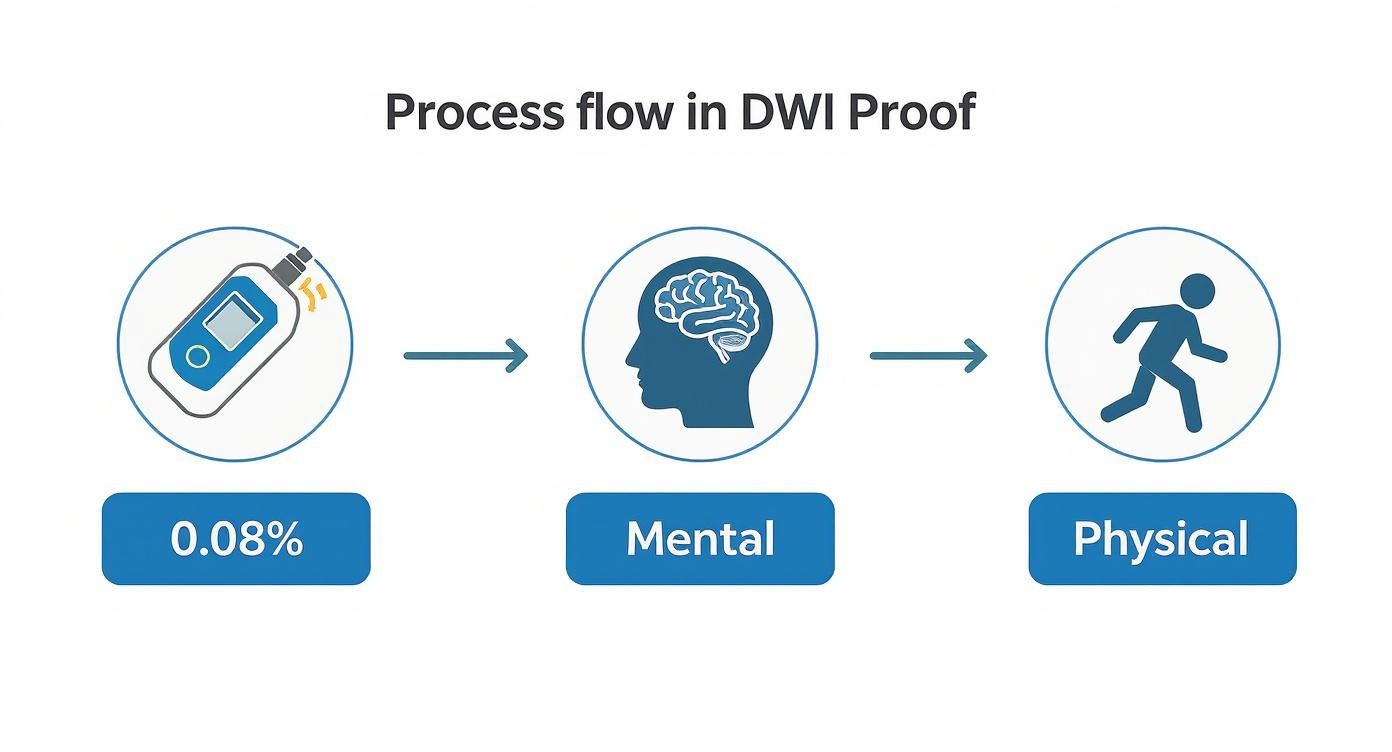The flash of red and blue lights in your rearview mirror is a heart-stopping moment for anyone. But for a Texas parent, that jolt of fear is instantly followed by a flood of terrifying questions. How will I get the kids to school? Will this affect my job? What happens to my family if I lose my license or, worse, face jail time? The weight of potential first offense DWI penalties can feel crushing, leaving you feeling isolated and overwhelmed. In these moments of uncertainty, it's critical to remember that one mistake does not define you as a parent, and you do not have to face this storm alone.
A Moment That Changes Everything

The path to a first-time DWI charge is rarely born from bad intentions. Imagine this scenario: You and your spouse finally manage a much-needed date night. Over dinner, you share a couple of glasses of wine and feel perfectly fine to drive home. On the way back, your phone buzzes—it's a text from the babysitter. You glance down for just a second, but in that split second, your car drifts slightly over the line.
Suddenly, those flashing lights are behind you. Your heart pounds. An officer approaches, and you answer his questions honestly, but he says he smells alcohol. He asks you to step out of the car. Now you’re on the side of a dark road, trying to perform confusing physical tests under the glare of headlights. The entire situation feels surreal, a nightmare from which you can't wake up. This is not just a traffic stop; it’s a moment that could have profound implications for your family, especially if it leads to an investigation by Child Protective Services (CPS).
The Initial Encounter and Arrest
This story is all too common. A minor traffic infraction often triggers a DWI investigation. The officer looks for "reasonable suspicion"—the smell of alcohol, slurred speech, or fumbling for your license. From there, events unfold rapidly:
- Field Sobriety Tests: You’ll be asked to perform Standardized Field Sobriety Tests (SFSTs), which are notoriously difficult even for a sober person.
- Chemical Test Request: The officer will ask for a breath or blood sample to measure your Blood Alcohol Concentration (BAC).
- The Arrest: If the officer believes there is probable cause, you will be arrested and taken to the station.
This entire process can turn a normal evening into one of the most stressful experiences of your life. But for a parent, the arrest is just the beginning. The choices you make during the traffic stop and immediately after can have a huge impact not only on your criminal case but also on your family's future, especially if CPS becomes involved. Understanding your rights is the first step toward protecting what matters most.
What a DWI Means Under Texas Law
To understand the penalties for a first-offense DWI, it's crucial to know what the state must prove. Most people think of the 0.08% BAC number, but under the Texas Penal Code, the definition of intoxication is broader and more subjective. This is critical because a DWI arrest, especially with a child in the car, can trigger a CPS investigation under Texas Family Code Chapter 262, which governs the procedures for taking a child into protective custody.
The prosecution only needs to prove one of three things for a conviction. Understanding these is the first step in building a defense that protects both your freedom and your family.
The Three Definitions of Intoxication
The state has three paths to prove intoxication. They only need to convince a jury of one of them:
- Having a blood alcohol concentration (BAC) of 0.08% or higher. This is the "per se" definition. If your test is 0.08% or more, you are considered legally intoxicated.
- Losing the normal use of your mental faculties. This is entirely subjective and based on an officer’s observations of your speech, confusion, or ability to follow instructions.
- Losing the normal use of your physical faculties. This is also subjective and is the reason for field sobriety tests. The officer is looking for poor balance, coordination, or physical control.
This means you can be arrested for DWI even if your BAC is under the legal limit. If an officer believes you've lost your normal mental or physical abilities, they can make an arrest. For a parent, this subjectivity is terrifying because a simple arrest can be interpreted by CPS as a sign of neglectful supervision.
How a Traffic Stop Impacts Your Family
Let’s return to our example. You had one glass of wine and know you aren't over the limit. The officer, however, notes your "glassy eyes." You're nervous and stumble slightly during the field sobriety tests on the uneven roadside. Even if a breath test shows a 0.06% BAC, the officer can arrest you based on their judgment that you’d lost the normal use of your physical faculties.
The prosecution's case isn't built on a scientific number; it's built on a police officer's personal judgment under stressful conditions. If your children were with you, this arrest could lead to a CPS caseworker at your door, investigating potential child endangerment. This is why having a legal advocate who understands both criminal defense and family law is crucial from the very beginning. An experienced attorney can challenge the officer’s subjective opinions and fight to protect you from penalties that could tear your family apart.
Protecting Your Driving Privileges After an Arrest
While the criminal charge proceeds through the court system, a separate, faster battle begins over your driver's license. This is the Administrative License Revocation (ALR) process. For Texas parents, losing the ability to drive is a logistical nightmare—it threatens your ability to work, take your children to school, and manage your family's daily life.

The Texas Department of Public Safety (DPS) acts quickly, and you have a very short time to respond.
The Critical 15-Day Rule
From the day of your arrest, you have exactly 15 days to request an ALR hearing. This is a strict deadline. If you miss it, your license will be automatically suspended on the 40th day after your arrest. Requesting this hearing is the only way to challenge the automatic suspension and keep your driving privileges while your criminal case is pending.
Refusal Versus Failure: What It Means for Your License
The length of the potential suspension depends on whether you refused the chemical test or took it and failed.
- Failing a Chemical Test: If you provided a sample with a BAC of 0.08% or higher, the proposed suspension for a first offense is 90 days.
- Refusing a Chemical Test: If you refused to provide a breath or blood sample, the proposed suspension is harsher: 180 days for a first-time refusal.
The state uses the longer suspension to encourage compliance. However, requesting an ALR hearing allows your attorney to fight either suspension. While penalties vary, the total financial fallout from a first offense can easily top $10,000 when you factor in fines and legal fees, with license suspensions often running from 3 to 6 months.
Navigating the ALR Hearing and Beyond
The ALR hearing is more than just a way to save your license; it’s a strategic opportunity. It gives your attorney an early chance to question the arresting officer under oath, which can reveal weaknesses in the state’s case that are vital for your criminal defense. In fact, exploring how to get criminal charges dropped often starts with the evidence uncovered during this hearing.
Even if the suspension is upheld, you have options. Your attorney can help you obtain an Occupational Driver's License (ODL).
An Occupational Driver's License, or essential need license, is a restricted license that allows you to drive to work, school, and for essential household duties. For a parent trying to maintain stability for their family, an ODL can be an absolute lifeline.
After a DWI arrest, losing your license can feel like the first domino to fall. While Texas has its own system, understanding how many points can lead to license suspension in other states shows how seriously these offenses are taken nationwide. The most important action you can take is to contact an attorney immediately to ensure you don’t miss that critical 15-day deadline.
Understanding the Criminal Penalties for a First DWI
While the license suspension is an urgent civil matter, the criminal charge carries the most severe consequences. A first-time DWI in Texas is typically a Class B Misdemeanor. For a parent, the thought of jail time or a permanent criminal record is terrifying, not just for you, but for the stability of your children.
It's vital to remember that these are the maximum penalties allowed by law, not a guaranteed sentence. An experienced defense attorney’s job is to challenge the evidence and fight for a better outcome. The first step is knowing what you are up against.
What a Class B Misdemeanor DWI Entails
If you are convicted of a first-offense DWI, the court can impose a range of penalties designed to impact your freedom and finances.
Here’s a breakdown of a standard conviction:
- Jail Time: A conviction carries a mandatory minimum of 72 hours in jail, with a maximum sentence of up to 180 days.
- Fines: The court can impose a fine of up to $2,000.
- Community Service: You could be ordered to complete 24 to 100 hours of community service.
- Annual Surcharges: A conviction means you must pay an annual fee to DPS to keep your license, typically $1,000 to $2,000 per year for three years.
It can feel overwhelming. To better understand this charge, you can learn more about a Class B Misdemeanor in Texas and its implications.
When Penalties Get More Severe
Not all first-time DWI charges are the same. Aggravating factors can upgrade the charge to a Class A Misdemeanor, which carries much harsher penalties. The most common reason for this is a high Blood Alcohol Concentration (BAC).
If your breath or blood sample shows a BAC of 0.15 or higher, the charge is automatically enhanced. This is nearly double the legal limit, and the courts treat it as an extreme danger deserving of more severe punishment.
Another aggravating factor is having an open container of alcohol in your vehicle, which can add a mandatory minimum of six days in jail to your sentence. A DWI with a child passenger under 15 is even more serious—it's a state jail felony.
Texas First-Offense DWI Penalties At-a-Glance
This table illustrates the difference between a standard and an enhanced first-offense DWI. It highlights why fighting for a reduction in charges is so critical for your family's future.
| Penalty Type | Standard First DWI (Class B Misdemeanor) | Enhanced First DWI (BAC ≥ 0.15, Class A Misdemeanor) |
|---|---|---|
| Potential Jail Time | 72 hours to 180 days | Up to 1 year in county jail |
| Maximum Fine | Up to $2,000 | Up to $4,000 |
| Annual DPS Surcharge | $1,000 – $1,500 per year for 3 years | $2,000 per year for 3 years |
| Ignition Interlock Device | May be ordered by the court | Often a mandatory condition of bond or probation |
These are statutory maximums. A strong legal defense can lead to reduced charges, probation instead of jail, or even a dismissal. But the table makes it clear: a first-offense DWI conviction can profoundly impact your freedom, finances, and ability to care for your family. You should never face these charges alone.
The Hidden Costs of a DWI Conviction
The court-ordered fines are just the beginning. The true impact of a first offense DWI conviction ripples through every aspect of your life, creating hidden costs that can strain your family’s finances and emotional well-being for years.

These consequences often appear long after your court case is over—in your insurance bills, job prospects, and even in how your family is perceived by agencies like CPS. Understanding these challenges is about preparing you for the full scope of what's at stake.
Soaring Insurance Premiums
After a DWI conviction, your auto insurance provider will classify you as a high-risk driver. Your premiums can easily double, an increase that can last for three to five years, costing your family thousands of extra dollars. Beyond court costs, this conviction affects your finances in other ways, like the significant impact on auto insurance rates outlined in this guide. You'll also need an SR-22 certificate, a special form your insurer files with the state, which comes with its own fees.
Career and Professional Consequences
A DWI on your permanent record can be a major barrier to employment. Many employers conduct background checks, and a conviction could disqualify you from jobs involving:
- Driving a company vehicle
- Holding a professional license (e.g., nurse, teacher, pilot)
- Working in fields requiring public trust
For a parent, this is devastating. A single mistake could threaten the career you've built to provide for your family. More alarmingly, a DWI conviction can be used by CPS as evidence in a family law case. They may argue it demonstrates a pattern of behavior that puts your children at risk, highlighting the connection between substance abuse and child neglect. Under Texas Family Code Chapter 161, a parent's rights can be terminated if their conduct endangers a child's well-being, and a DWI can be twisted to fit that narrative.
The Ignition Interlock Device Burden
If ordered by the court, you must have an Ignition Interlock Device (IID) installed in your vehicle at your own expense. This device is a breathalyzer connected to your car's ignition.
An IID comes with ongoing costs: installation fees, monthly monitoring fees, and a final removal fee. These expenses can easily exceed $1,000 over a single year, adding another financial burden to your family.
These hidden costs demonstrate why fighting the charge from day one is so essential to protecting your family's future.
Frequently Asked Questions About a First Texas DWI
When you’re facing a DWI charge, the uncertainty can be overwhelming. As a parent, you need clear, straightforward answers. This section addresses the most common concerns we hear from Texas families navigating the penalties for a first DWI offense. Our goal is to provide clarity and help you feel more in control.
Will I Go to Jail for a First DWI in Texas?
This is the most pressing question for most parents. While a first-offense DWI carries a potential jail sentence of 72 hours to 180 days, it is not always mandatory. An effective attorney's primary goal is to negotiate alternatives, most commonly probation (community supervision). This allows you to serve your sentence in the community under specific court-ordered conditions. The outcome depends on the specifics of your case, but our objective is always to find a path that avoids jail and keeps your family together.
Can My First DWI Charge Be Dismissed?
Yes, a dismissal is possible and is the best-case scenario we work toward. A dismissal means the prosecutor drops the case, and you can later pursue an expunction to clear your record completely.
A case may be dismissed if your attorney successfully challenges the evidence by arguing:
- Illegal Traffic Stop: If the officer lacked a valid reason to pull you over, all subsequent evidence could be suppressed.
- Improperly Administered Tests: Field sobriety and chemical tests must follow strict protocols. Any error can render the results unreliable.
- Inaccurate Chemical Test Results: Breathalyzers can malfunction, and blood samples can be contaminated or mishandled.
A skilled DWI lawyer will meticulously examine every piece of evidence to find weaknesses in the state's case, aiming to force a dismissal or a significant reduction in charges.
How Long Does a DWI Stay on Your Record in Texas?
A DWI conviction in Texas stays on your criminal record permanently. It does not automatically fall off or get sealed after a few years. While a non-disclosure order (which seals the record from public view) is possible in rare situations, it is uncommon for DWI convictions.
This is why it is so critical to fight the charge from the very beginning. If your case is dismissed or you are found not guilty, you are eligible to have the entire record of your arrest expunged. An expunction legally destroys the records, allowing you to deny the arrest ever occurred. This is the only way to truly protect your family from the long-term consequences.
Why Is the ALR Hearing So Important?
The Administrative License Revocation (ALR) hearing is your only chance to prevent the Texas Department of Public Safety (DPS) from suspending your driver's license. You have only 15 days from your arrest to request this hearing.
The ALR hearing is crucial for two reasons:
First, winning the hearing saves your license, allowing you to continue managing your family's life without interruption.
Second, it provides a powerful strategic advantage. It is the first opportunity for your attorney to question the arresting officer under oath, long before a criminal trial. This "free look" can uncover inconsistencies and weaknesses in the officer's testimony, providing invaluable evidence to dismantle the criminal case against you.
Facing first offense DWI penalties can make you feel like your world is falling apart, but you do not have to endure this alone. The compassionate and experienced attorneys at The Law Office of Bryan Fagan understand what is at stake for you and your family. We are here to protect your rights, your future, and your role as a parent. We invite you to contact us for a free, confidential consultation to discuss your case and learn how we can help you navigate this difficult time with strength and confidence.




